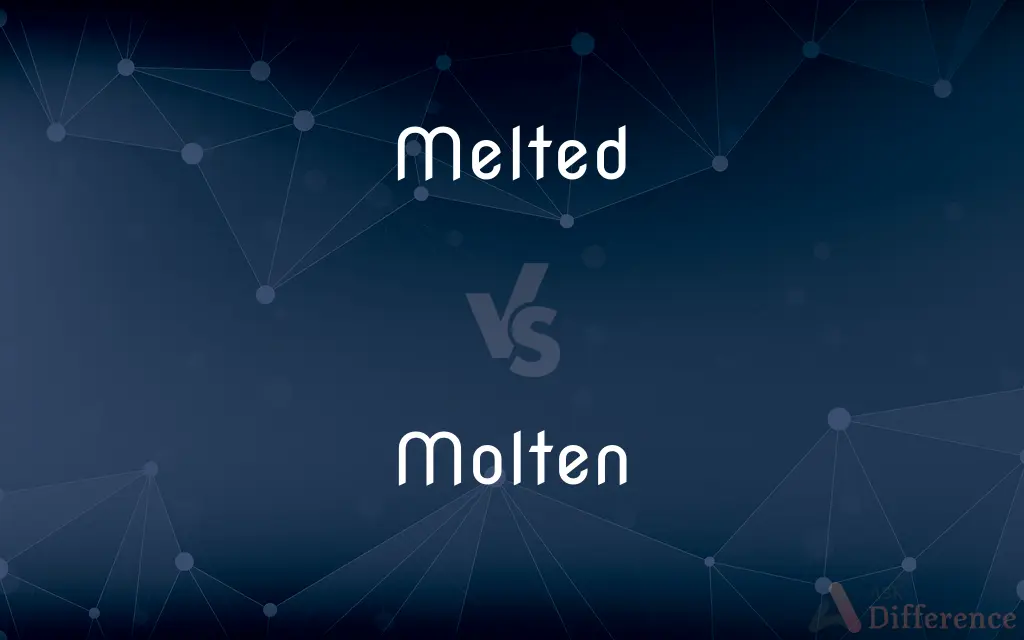Melted vs. Molten — What's the Difference?
By Tayyaba Rehman & Fiza Rafique — Updated on April 3, 2024
Melted refers to the process of becoming liquid from solid due to heat, while molten describes the state of being in liquid form because of high temperatures.

Difference Between Melted and Molten
Table of Contents
ADVERTISEMENT
Key Differences
Melted is the past tense of melt, indicating that a solid has been transformed into a liquid by heat. This term emphasizes the action or process that has occurred, suggesting a change in state. On the other hand, molten is an adjective that describes materials, typically metals or rocks, that are in a liquid state due to extreme heat. While "melted" focuses on the transition, "molten" highlights the current state of being liquefied by heat.
When you say something has melted, you're referring to the outcome of applying heat to a solid, such as ice turning into water. It suggests a temporary or reversible change, often associated with substances like ice, butter, or chocolate. Molten, however, is often used for materials that require much higher temperatures to liquefy, such as molten lava or molten steel, suggesting a more intense and sometimes less reversible process due to the materials involved.
The use of "molten" implies a degree of fluidity and heat that "melted" does not necessarily convey. For example, molten glass at a glassblowing studio signifies not just liquefied glass, but glass in a state hot and fluid enough to be worked and molded. Meanwhile, melted ice cream simply indicates ice cream that has lost its solid form, without the implication of high temperatures or the potential for being reshaped.
Additionally, "molten" carries connotations of intensity and danger that are not present with "melted." The term often describes substances in a state that requires careful handling due to the high temperatures involved, such as molten metal in a foundry, where specialized equipment and precautions are necessary to manage the material safely.
In scientific contexts, "melted" can be used more broadly to describe any solid-to-liquid transition due to heat, without specifying the temperature range or material type. "Molten," however, is specifically applied to materials in a liquid state because of very high heat, highlighting not just the state but also the conditions under which that state is maintained.
ADVERTISEMENT
Comparison Chart
Definition
Refers to the process of changing from solid to liquid by heat.
Describes the state of being liquid due to high temperatures.
Usage
Emphasizes the action or process.
Highlights the current state and condition.
Common Examples
Ice into water, melted butter, melted chocolate.
Molten lava, molten steel, molten glass.
Connotations
Temporary or reversible change, lower temperatures.
Intensity, high temperatures, potential danger.
Applications
Broad, applies to many substances and contexts.
More specific, often used for metals and rocks.
Compare with Definitions
Melted
Changed from solid to liquid by heat.
The melted ice cream dripped onto the floor.
Molten
Specifically applies to certain materials.
The blacksmith worked with molten iron.
Melted
Indicates a past action or transition.
The snow melted quickly in the sun.
Molten
In a liquid state because of extreme heat.
Molten lava flowed from the volcano.
Melted
Often implies a reversible process.
The chocolate bars had melted in the heat but solidified again in the fridge.
Molten
Associated with high temperatures.
The geologist studied molten rock beneath the earth's surface.
Melted
Can refer to a broad range of substances.
She added melted butter to the recipe.
Molten
Describes a current state, often with danger.
They had to wear protective gear near the molten metal.
Melted
Does not necessarily imply extreme heat.
The wax candles melted during the power outage.
Molten
Implies fluidity and the potential for molding.
Molten glass was blown into beautiful shapes.
Melted
Melted is the third album by American garage rock singer-songwriter Ty Segall. It was released on June 15, 2010 on Goner Records, on CD/LP formats.
Molten
Made liquid by heat; melted
Molten lead.
Melted
To be changed from a solid to a liquid state especially by the application of heat.
Molten
Made by melting and casting in a mold.
Melted
To dissolve
Sugar melts in water.
Molten
Brilliantly glowing, from or as if from intense heat
"A huge red bed of coals blazed and quivered with molten fury" (Richard Wright).
Melted
To disappear or vanish gradually as if by dissolving
The crowd melted away after the rally.
Molten
A past participle of melt.
Melted
To pass or merge imperceptibly into something else
Sea melted into sky along the horizon.
Molten
Melted.
Molten metal
Molten wax
Molten rock
Melted
To become softened in feeling
Our hearts melted at the child's tears.
Molten
Made from a melted substance. en
Melted
(Obsolete) To be overcome or crushed, as by grief, dismay, or fear.
Molten
Glowing red-hot.
Melted
To change (a solid) to a liquid state especially by the application of heat.
Molten
(archaic) melt
Melted
To dissolve
The tide melted our sand castle away.
Molten
Melted; being in a state of fusion, esp. when the liquid state is produced by a high degree of heat; as, molten iron.
Melted
To cause to disappear gradually; disperse.
Molten
Made by melting and casting the substance or metal of which the thing is formed; as, a molten image.
Melted
To cause (units) to blend
"Here individuals of all races are melted into a new race of men" (Michel Guillaume Jean de Crèvecoeur).
Molten
Reduced to liquid form by heating;
A mass of molten rock
Melted
To soften (someone's feelings); make gentle or tender.
Melted
A melted solid; a fused mass.
Melted
The state of being melted.
Melted
The act or operation of melting.
Melted
The quantity melted at a single operation or in one period.
Melted
A usually open sandwich topped with melted cheese
A tuna melt.
Melted
Simple past tense and past participle of melt
Melted
Being in a liquid state as a result of melting.
Melted ice cream just isn't as much fun to eat.
Melted
Changed from a solid to a liquid state;
Rivers filled to overflowing by melted snow
Common Curiosities
Is molten lava the same as melted rock?
Yes, in a sense, molten lava is melted rock, but "molten" specifically emphasizes its liquid state due to the extreme heat within the Earth.
Can water be described as molten?
No, water is not described as molten because it does not require the extreme temperatures associated with the term "molten."
Can "molten" be used for any melted substance?
No, "molten" is typically used for substances that melt at very high temperatures, like metals or rock, and not for substances like ice or chocolate.
Is the process of becoming molten reversible?
While technically reversible by reheating, materials that become molten often undergo chemical or physical changes that can make the process more complex than simply melting and solidifying.
What happens when something molten cools down?
When something molten cools down, it solidifies, transitioning back into a solid state as it loses heat.
How do you safely handle molten substances?
Handling molten substances requires specialized equipment and safety protocols to protect against the extreme heat and potential hazards of the material.
Are there substances that can be both melted and molten?
Yes, substances like metals can be described as melted during the heating process and molten when they reach a liquid state at high temperatures.
What scientific principles are involved in melting and becoming molten?
Both involve the application of heat to overcome the molecular bonds holding a solid together, requiring energy input to transition to a liquid state.
Why is "molten" often associated with danger?
Because it implies extremely high temperatures that can cause burns or other injuries, necessitating caution and protective measures.
Can "melted" imply a change in chemical properties?
Melting is a physical change, not a chemical one. The substance retains its chemical properties, though it changes state.
Share Your Discovery

Previous Comparison
Personality vs. Attitude
Next Comparison
Jibe vs. GibeAuthor Spotlight
Written by
Tayyaba RehmanTayyaba Rehman is a distinguished writer, currently serving as a primary contributor to askdifference.com. As a researcher in semantics and etymology, Tayyaba's passion for the complexity of languages and their distinctions has found a perfect home on the platform. Tayyaba delves into the intricacies of language, distinguishing between commonly confused words and phrases, thereby providing clarity for readers worldwide.
Co-written by
Fiza RafiqueFiza Rafique is a skilled content writer at AskDifference.com, where she meticulously refines and enhances written pieces. Drawing from her vast editorial expertise, Fiza ensures clarity, accuracy, and precision in every article. Passionate about language, she continually seeks to elevate the quality of content for readers worldwide.














































